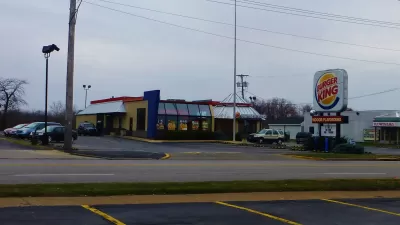A new study published in the February issue of Health Affairs presents evidence that providing fresh food in food deserts does not improve diets or health outcomes for residents.

Adding supermarkets to neighborhoods with a dearth of access to fresh and healthy food does not lead to improvements in residents' diets or health outcomes, according to an article by Clara Ritger, who details the findings of a report by a team of researchers from the London School of Hygiene and Tropical Medicine and Penn State University's departments of sociology, anthropology, and demography.
According to Ritger’s description, the study compares two neighborhoods in Philadelphia, one which received a new supermarket, and one which did not: “When a grocery store was opened in one Philadelphia food desert, 26.7 percent of residents made it their main grocery store and 51.4 percent indicated using it for any food shopping, the report found. But among the population that used the new supermarket, the researchers saw no significant improvement in BMI, fruit and vegetable intake, or perceptions of food accessibility, although there was a significant improvement in perception of accessibility to fruits and vegetables.”
Ritger’s reporting connects the study’s findings to the $500 million federal Healthy Food Financing Initiative: “if the conclusion is borne out, it would suggest that policymakers rethink the Healthy Food Financing Initiative if they want to promote healthier eating and healthier citizens.”
The new report isn’t the first in 2014 to question whether current programs are doing enough to solve the growing problem of obesity in this country. But then again, another recent report ties fast food to growing Body Mass Index in wealthy countries.
FULL STORY: Bad News for Obama’s Antiobesity Effort

Planetizen Federal Action Tracker
A weekly monitor of how Trump’s orders and actions are impacting planners and planning in America.

Chicago’s Ghost Rails
Just beneath the surface of the modern city lie the remnants of its expansive early 20th-century streetcar system.

San Antonio and Austin are Fusing Into one Massive Megaregion
The region spanning the two central Texas cities is growing fast, posing challenges for local infrastructure and water supplies.

Since Zion's Shuttles Went Electric “The Smog is Gone”
Visitors to Zion National Park can enjoy the canyon via the nation’s first fully electric park shuttle system.

Trump Distributing DOT Safety Funds at 1/10 Rate of Biden
Funds for Safe Streets and other transportation safety and equity programs are being held up by administrative reviews and conflicts with the Trump administration’s priorities.

German Cities Subsidize Taxis for Women Amid Wave of Violence
Free or low-cost taxi rides can help women navigate cities more safely, but critics say the programs don't address the root causes of violence against women.
Urban Design for Planners 1: Software Tools
This six-course series explores essential urban design concepts using open source software and equips planners with the tools they need to participate fully in the urban design process.
Planning for Universal Design
Learn the tools for implementing Universal Design in planning regulations.
planning NEXT
Appalachian Highlands Housing Partners
Mpact (founded as Rail~Volution)
City of Camden Redevelopment Agency
City of Astoria
City of Portland
City of Laramie




























